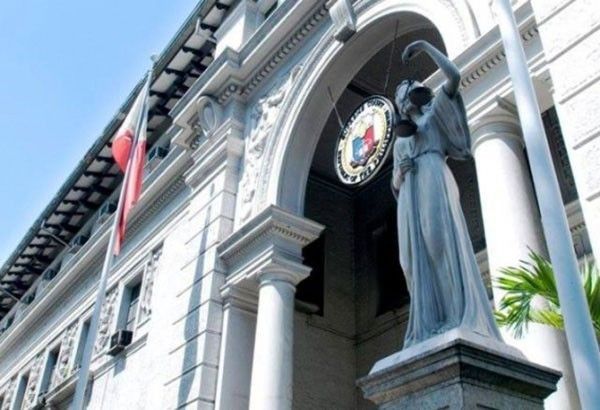Philippines' Rule of Law score dips further

MANILA, Philippines (Updated 5:16 p.m.) — The Philippines scored 3.4 out of 10 points in Rule of Law the latest 2018 Human Freedom Index, where the country dropped two places among 162 countries measured.
The report, published by the Cato Institute, the Fraser Institute and the German Friedrich Naumann Foundation for Freedom, rated personal, civil and economic freedom worldwide. In the latest report, the Philippines scored 3.4 for Rule of Law, posting a decline of 0.5 points from 3.9 in 2017.
This was a further decline from 4.05 in 2016.
The HFI uses a 10-point scoring system,where 10 represents “more freedom.”
The Philippines ranked 73rd among 162 countries in the overall human freedom index which combined scores on personal freedom and economic freedom.
The country scored 6.50 in personal freedom—which had 37 sub indexes—ranked 100 out of 162 countries. The country fared better in economic freedom, as it obtained 7.34 rating placing 49th out of 162 countries.
In looking into a country's personal freedom, the HFI measured rule of law, security and safety, movement, religious freedom, association, assembly and civil society, expression and information and identity and relationships.
Rule of Law
There was a 0.5 decline in the Philippines’ score in Rule of Law of 3.4 from last year’s score of 3.9.
A country’s score on rule of law is based on on three sub indexes: Procedural justice, civil justice and criminal justice.
“By including the Rule of Law category, the index more fully captures the extent to which people are exposed to abuse by the authorities, and therefore it provides a measure of whether and by how much one is subject to another man’s will,’” the report read borrowing words from F.A. Hayek, an Austrian economist and philosopher.
Procedural justice: A decline of 1.1 points
The Philippines recorded a decline of 1.1 on procedural justice. The country posted a score 2.5 for 2018 while the country obtained 3.6 last year.
Procedural justice has three indicators. First is a person’s “right to life and security,” where “violations by the police or government when conducting an arrest or a search” affect a country’s score.
Under the procedural justice, HFI looked into “due process of law and rights of the accused.” This indicator looks into the authorities’ respect on the presumption of innocence, arrest people on genuine and formally declared charges, treat suspects humanely in custody and provide the accused full access to evidence.
Freedom from arbitrary interference with privacy—the third category under procedural justice, measured on whether the government may be wiretapping private communications.
Civil justice: 4.7 from 4.5
For 2018’s measure of civil justice, the Philippines scored 0.2 higher—4.7—that 2017’s score of 4.5.
Civil justice, meanwhile, looks into whether the country is free of discrimination, corruption and improper government influence, the accessibility and effectiveness of alternative dispute resolution mechanisms
Criminal justice system on impartiality, level of corruption and the degree to which improper government influence is present.
Criminal justice: 3.1 from 3.6
Criminal justice meanwhile looked into issues of “impartiality, its level of corruption, and the degree to which improper government influence is present.”
The Philippines shed 0.5 points in this index.
Philippine Judiciary
The HFI said that in measuring the Rule of Law index, it followed the indicators used by the World Justice Project’s Rule of Law Index “that are consistent with our definition of freedom.”
In the 2017-2018 World Justice Project Rule of Law Index, the Philippines registered the most significant drop in rule of law adherence as it dropped 18 positions from its 2016 rankings.
The WJP report read: “The Philippines saw the most significant drops in Constraints on Government Powers, Fundamental Powers, Fundamental Rights, Order and Security, and Criminal Justice.”
The Philippines has had three chief justices in 2018: Former Chief Justice Maria Lourdes Sereno was ousted in May when her colleagues voted in favor of a quo warranto petition against her. This landmark ruling of the SC was widely criticized by several groups and lawmakers.
President Rodrigo Duterte then appointed retired Teresita de Castro to take over Sereno’s seat. She held the top judge post for less than two months.
Currently, the Supreme Court and the Philippine judiciary is headed by Chief Justice Lucas Bersamin.
International Criminal Court
It was also in 2018 when the International Criminal Court announced that it is conducting preliminary examination into the communications filed before the tribunal, on alleged crimes against humanity carried out under the Duterte administration.
The ICC, in its annual report released earlier in December, said that the Office of the Prosecutor has been conducting a thorough factual and legal assessment of the information available in order to reach a reasonable basis to believe that the alleged crimes fall within the jurisdiction of the court.
Under the principle of complementarity, the ICC can investigate when national jurisdictions are unable or unwilling to do so. But the Palace is consistent in denying this allegation.
The government, through a statement by presidential spokesperson Salvador Panelo, has distanced itself from the ICC deliberations.
“Its democratic institutions, including the judiciary, are fully functioning, and government agencies are working together to address the drug problem, from community-level engagements to rehabilitation, from law enforcement to investigation and prosecution,” the statement read.
The Palace earlier hailed the conviction of three Caloocan cops in the killing of 17-year-old Kian delos Santos as a "triumph of justice."
Delos Santos’ case is the first recognized case connected to the drug war that has claimed thousands of Filipino lives.
READ: On Kian's slay, court tells cops: Murder 'never... a function of law enforcement' — Kristine Joy Patag
- Latest
- Trending































